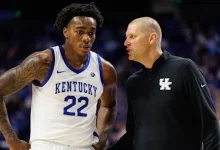Auburn football has added Middle Tennessee State to its 2027 schedule, continuing to build future non-conference matchups. The game is set for Jordan-Hare Stadium.

Auburn University has officially added Middle Tennessee State University (MTSU) to its 2027 football schedule, continuing a long-standing tradition of strategic non-conference scheduling. The game is slated to be played at Jordan-Hare Stadium in Auburn, Alabama, and will likely take place during the early part of the season, serving as one of the Tigers’ warm-up games before diving into the gauntlet of Southeastern Conference (SEC) competition.
This matchup might not raise national eyebrows on its own, but it reflects a broader trend in the way major college football programs construct their schedules—balancing competitiveness, logistics, and financial considerations.
A Familiar Pattern: Non-Conference Strategy
Auburn’s scheduling of MTSU fits neatly into a pattern that the Tigers—and many other SEC programs—have followed for years. Each season, teams like Auburn schedule three to four non-conference games alongside their SEC slate. These games generally fall into three categories:
- Power Five Opponent: Often a neutral-site or home-and-home series with a notable non-conference team (e.g., Penn State, Oregon).
- Group of Five Team: A quality mid-major opponent, such as MTSU, that presents a challenge without the intensity of SEC play.
- FCS or Transitional Program: These games are generally “tune-ups,” offering playing time for backups and helping the team build confidence.
By scheduling MTSU, Auburn is choosing an opponent with enough competitive legitimacy to keep the players focused while still being a likely win. This matchup allows Auburn to test its depth, experiment with schemes, and prepare for tougher opponents ahead.
Understanding the Opponent: Middle Tennessee State
MTSU, a member of Conference USA, is no stranger to playing SEC opponents. While the Blue Raiders don’t have the depth or resources of a Power Five school, they often field scrappy, fast teams capable of making a game interesting—especially early in the season when underdogs can sometimes catch their bigger opponents off guard.
For Middle Tennessee, the trip to Auburn is an opportunity for exposure, experience, and revenue. These “guarantee games,” where the visiting team is paid a substantial fee for their appearance, are often essential to the athletic budgets of Group of Five programs. MTSU benefits by gaining national visibility, showcasing its players on a bigger stage, and securing funds to support its broader athletic department.
Financial Implications for Both Sides
Although official figures for the payout may not be publicly disclosed yet, it’s common for programs like Auburn to pay $1 million or more to Group of Five teams for a single non-conference game. From Auburn’s perspective, it’s an investment: the school brings in revenue from ticket sales, concessions, merchandise, and broadcasting rights. Hosting a home game, even against a smaller opponent, often nets a positive financial return.
For MTSU, these types of games are often critical to funding athletic scholarships, facilities, and operations. A single payout from a Power Five opponent can support several non-revenue sports or go toward long-term development projects.
Timing in the Schedule
While exact dates haven’t been officially confirmed, games like this one are typically scheduled in the first three weeks of the season. Auburn usually opens the year with an easier opponent to work out early-season issues, then escalates to either a Power Five challenge or begins SEC play by Week 4.
Placing MTSU early in the 2027 schedule would follow Auburn’s traditional formula: start with a manageable opponent, build confidence, and prepare for the rigors of the SEC. It also gives Auburn’s coaching staff a chance to evaluate new starters, especially if the program is coming off a year of roster turnover due to graduation or the NFL Draft.
SEC Landscape and Scheduling Pressure
With the continued evolution of the SEC—especially with the addition of Texas and Oklahoma to the conference—scheduling has become more complicated. Auburn’s league schedule is already one of the most demanding in the nation, with annual matchups against Alabama, Georgia, LSU, and other conference powers. As a result, Auburn must be strategic in selecting non-conference opponents that offer a competitive edge without overextending the roster.
Balancing strength of schedule with overall win potential is now more important than ever, especially with the expansion of the College Football Playoff to 12 teams. Every win matters, and a loss to a lesser-regarded opponent early in the year can derail playoff hopes. That’s why programs like Auburn are cautious about scheduling too aggressively outside of conference play.
Recruiting and Regional Reach
Another aspect of this matchup is recruiting. Games against regional opponents like MTSU help Auburn maintain a strong presence in the Southeast. While Alabama is Auburn’s primary recruiting base, Tennessee has long been a fertile ground for high school talent. Playing a Tennessee-based school keeps the Auburn brand visible in the state and might sway a few prospects who are considering schools in both states.
Additionally, it gives Auburn’s coaches an opportunity to evaluate regional talent in a live setting. MTSU often recruits players who were just below the Power Five radar. Facing them in game action allows Auburn to evaluate late-bloomers or potential transfer targets in the future.
Historical Precedents
Auburn has faced Middle Tennessee State only a few times in its history, if at all. While there is no deep-rooted rivalry between the schools, games like this still hold meaning in the broader context of college football. They reflect the relationships between conferences and the hierarchy within the sport.
Historically, Auburn has scheduled similar programs in the early part of each season. Teams like UAB, Troy, Georgia Southern, and Appalachian State have all made appearances on Auburn’s schedule over the years. These matchups have varied in competitiveness, but they almost always serve the same purpose: preparation and progression.
The Fan Experience
From a fan perspective, these games are often an opportunity to enjoy a relaxed atmosphere at Jordan-Hare. Families, alumni, and casual fans can attend a game that is more affordable and less pressure-filled than the Iron Bowl or a major SEC rivalry. It’s also a chance to see new players in action—true freshmen, transfers, and developing talent all get their shot on the field.
While blowouts are common in these matchups, fans often enjoy the opportunity to reconnect with Auburn football after the long offseason. The band plays, the eagle flies, and a win gets everyone feeling optimistic about the season ahead.
Player Development
Games like the one against MTSU offer invaluable development opportunities for Auburn’s younger players. While the starters may only play a half or three quarters, backups often get extended playing time. This can be crucial in building depth and confidence across the roster.
Injury prevention is another factor. Playing a less physical opponent early in the season can help keep the team healthy for the grind of SEC play. While no game is without risk, coaches often use these matchups to fine-tune execution and correct mistakes without major consequences.
Middle Tennessee’s Perspective
From MTSU’s point of view, the game offers more than just a paycheck. Playing against an SEC program gives its players a unique experience—competing in front of 85,000 fans in one of the sport’s most iconic venues. These games are often remembered by the players and fans for years, regardless of the outcome.
It also serves as a measuring stick for the program. Coaches can evaluate how their team stacks up physically and mentally against top-tier opposition. Even a close loss can build morale and serve as momentum heading into conference play.
Conclusion: A Win-Win Arrangement
Though this game won’t be featured on primetime television or determine playoff fates, it plays an important role in the fabric of a college football season. For Auburn, it’s a strategic decision aimed at balancing competition, development, and preparation. For Middle Tennessee, it’s an opportunity to showcase their program and benefit financially from the exposure.
As the 2027 season approaches, fans will circle this game not because it promises a thrilling finish, but because it marks the start of another journey for the Auburn Tigers—a journey that, with any luck, will end in playoff contention or a New Year’s Six bowl.
College football is as much about tradition and community as it is about wins and losses. And games like Auburn vs. Middle Tennessee help preserve that spirit, offering something for everyone—from players and coaches to fans and families.









